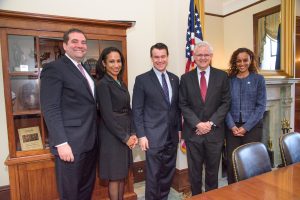
In early May, Dr. Una Osili, associate dean for research and international programs at the Indiana University Lilly Family School of Philanthropy, testified before the U.S. Senate Foreign Relations Committee’s Subcommittee on Multilateral International Development, Multilateral Institutions, and International Economic, Energy, and Environmental Policy at the invitation of Indiana’s Senator Todd Young, who chairs the subcommittee. Dr. Osili recently spoke about the focus of her testimony and her experience on Capitol Hill.
The journey started with transfer of two reknowned and highly-respected studies about international philanthropy, the Index of Global Philanthropy and Remittances and the Index of Philanthropic Freedom from the Hudson Institute where they were founded to the Lilly Family School of Philanthropy in early 2017.
Dr. Osili, a researcher in the areas of development economics and remittances, had been an advisor to the projects while they were at the Hudson Institute’s Center for Global Prosperity.
“Dr. Carol Adelman, the director of the Center for Global Prosperity and senior fellow at the Hudson Institute led the indices, and she was confident that the Lilly Family School of Philanthropy would provide a strong institutional home for the projects. She also knew that Indiana University had the expertise, resources, and academic grounding that would help solidify the work of the indices and their reputation,” Dr. Osili said.
A Celebration of Global Philanthropy event in Washington, DC, in March 2017 marked the transfer of the indices and brought together researchers, policy makers, and leaders in global development. Senator Young delivered the keynote address.
 As the subcommittee’s chairman, head of the previously-mentioned subcommittee, Senator Young recognized the importance of timely data about private flows of funds to developing countries. In light of current policy discussions about official development assistance (ODA), he wanted to raise awareness that while ODA continues to play a central role, the private sector including foreign direct investment (FDI), remittances from immigrants, as well as donations from corporations, individuals, and foundations make up a growing share of financial flows to developing countries.
As the subcommittee’s chairman, head of the previously-mentioned subcommittee, Senator Young recognized the importance of timely data about private flows of funds to developing countries. In light of current policy discussions about official development assistance (ODA), he wanted to raise awareness that while ODA continues to play a central role, the private sector including foreign direct investment (FDI), remittances from immigrants, as well as donations from corporations, individuals, and foundations make up a growing share of financial flows to developing countries.
“Senator Young hoped we could help his Senate colleagues and other policy makers understand the size of those flows and answer some of the questions about how official assistance programs such as the U.S. Agency for International Development and other official development organizations could partner with some of the private sector agencies and private philanthropy to accomplish development goals,” Dr. Osili said.
Also testifying at the subcommittee hearing were Daniel Runde, director of the Project on Prosperity and Development and the William A. Schreyer Chair in Global Analysis at the Center for Strategic and International Studies; Sam Worthington, CEO of InterAction; and Semhar Araia, UNICEF USA’s Managing Director of Diaspora and Multicultural Partnerships.
“In addition to the opportunity to share the school’s research with policymakers, it was also an enjoyable trip. At the last minute, my son, a junior in high school wanted to come and he was able to sit in an assigned seat and observe the hearing. Senator Young recognized him during the hearing; it was a memorable experience for him.”
Dr. Osili learned from the other panelists as well.
“We all gained insight from hearing each other’s testimony and from the questions that we posed, which expanded our understanding on how the global development landscape is changing,” she said. “Speaking with them also sparked a discussion on how we can bring more research to this field for a broader perspective.”
Dr. Osili hopes that the discussion, as well as the testimony, can bring more awareness and visibility to the subject of private and public flows to developing countries.
“The goal is to foster and encourage more collaboration and determine how government and private sector actors can partner more so that they can more effectively meet complex development challenges in the areas of education, health, the environment, and other areas,” she said. “Global philanthropy has grown over the past few decades, and it is leading to new debates on how best to structure official development assistance between the U.S. and developing countries.
“It’s a more complex environment than it was 30 or 40 years ago. I also hope that an understanding of the importance of data on private flows to developing countries such as this information can inform policy changes.”
Already, there has been activity coming out of the testimony given by Dr. Osili and the other experts.
“The Center for Strategic and International Studies organized a bipartisan task force (led by Senator Young and Senator Jeanne Shaheen of New Hampshire) on how best to restructure U.S. development efforts to maximize effectiveness and efficiency,” she said. “The school provided some background research based on the Global Indices and these research insights helped inform bipartisan legislation introduced by Senators Young and Shaheen in May. That’s an immediate outcome, but we also want to continue to raise the visibility of the Global Indices and of the school’s research as an important resource in understanding global development.”
Watch Osili’s testimony Read Osili’s testimony View the full hearing



